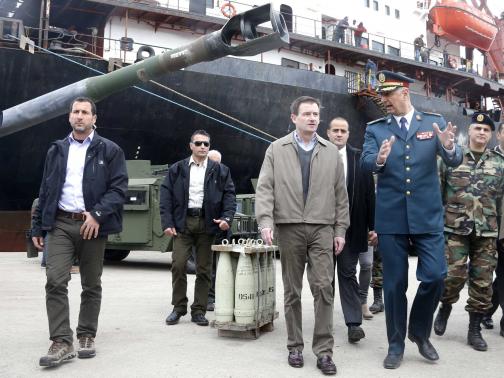
(Reuters) – The United States delivered more than $25 million worth of military aid including heavy artillery to the Lebanese army on Sunday to help it fight jihadist groups which have repeatedly battled with security forces near the Syrian border.
The U.S. ambassador to Beirut, David Hale, said in a statement the weapons would be used to "defeat the terrorist and extremist threat from Syria".
"We are fighting the same enemy, so our support for you has been swift and continuous," Hale said at an event marking the delivery of the weapons in Beirut.
The Lebanese army has fought regular battles with armed groups including militants linked to Islamic State and the al Qaeda-affiliated Nusra Front in areas near the Syrian border, most recently late last month when six soldiers were killed.
Hale said Lebanon was the fifth biggest recipient of U.S. military aid. It received more than $100 million last year. Lebanese officials have warned of plans by radical Islamist groups fighting in the Syria war to seize territory in Lebanon.
While the U.S.-backed Lebanese army has been battling hard-line Islamists on the Lebanese side of the frontier, the Iranian-backed Lebanese Shi’ite group Hezbollah has been fighting the same groups on the Syrian side of the border — part of its role fighting alongside Damascus in the Syrian war.
The Lebanese army, rebuilt after the country’s 1975-90 civil war, is one of the strongest institutions in the country, but it has been hamstrung by outdated weapons.
France and Lebanon signed a $3 billion Saudi-funded deal in early November to provide French weapons and military equipment, including helicopters, to the Lebanese army.
A Lebanese government statement said French Foreign Minister Laurent Fabius told Lebanese Prime Minister Tammam Salam on the sidelines of a Munich security conference they would get the first batch of weapons under the deal in April.
The United States has accelerated the delivery of military aid to Lebanon since last August, when Islamist militants staged a major attack in the border town of Arsal, said Nabil Haitham, a columnist in the Lebanese newspaper As-Safir.
"Despite the importance of these weapons, they cannot make up for the big shortfall from which the army is suffering," he told Reuters, adding that helicopters were vital.
(Reporting by Laila Bassam/Tom Perry; Editing by Gareth Jones/Robin Pomeroy)



